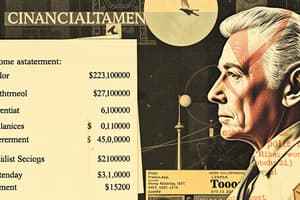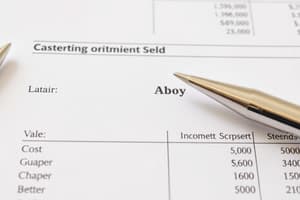Podcast
Questions and Answers
What is a primary aim of cost accounting regarding production costs?
What is a primary aim of cost accounting regarding production costs?
- To ascertain per-unit production cost (correct)
- To measure employee productivity
- To determine total sales revenue
- To analyze market trends
How does cost accounting assist in the preparation of selling prices?
How does cost accounting assist in the preparation of selling prices?
- By conducting a competitive analysis
- By estimating future market demand
- By determining the cost of production (correct)
- By analyzing customer preferences
Which of the following is NOT an objective of cost accounting?
Which of the following is NOT an objective of cost accounting?
- Promote employee engagement through team-building (correct)
- Enable cost control and reduction
- Identify wastages and inefficiencies
- Prepare periodical cost statements and reports
What technique does cost accounting use to aid in cost reduction?
What technique does cost accounting use to aid in cost reduction?
Which objective of cost accounting involves understanding the financial performance of various divisions?
Which objective of cost accounting involves understanding the financial performance of various divisions?
Cost accounting provides relevant data for which important business aspect?
Cost accounting provides relevant data for which important business aspect?
What role does cost accounting play in formulating incentive plans?
What role does cost accounting play in formulating incentive plans?
Under which section of the Companies Act is cost audit regulated?
Under which section of the Companies Act is cost audit regulated?
What is the total Gross Profit reported in the income statement?
What is the total Gross Profit reported in the income statement?
Which of the following reflects a lack of system for appraising labor efficiency?
Which of the following reflects a lack of system for appraising labor efficiency?
Which statement best describes the focus of cost accounting compared to financial accounting?
Which statement best describes the focus of cost accounting compared to financial accounting?
What is a direct consequence of not having a proper material control system?
What is a direct consequence of not having a proper material control system?
What type of costs are not classified appropriately in financial accounting?
What type of costs are not classified appropriately in financial accounting?
Which issue arises from inadequate information for price fixation in cost accounting?
Which issue arises from inadequate information for price fixation in cost accounting?
What is NOT a drawback of financial accounting mentioned in the content?
What is NOT a drawback of financial accounting mentioned in the content?
What impact does the lack of a labor cost control system have on a company's operations?
What impact does the lack of a labor cost control system have on a company's operations?
What does cost organization primarily facilitate within a company?
What does cost organization primarily facilitate within a company?
In a small to medium-sized concern, how is the cost accounting department typically structured?
In a small to medium-sized concern, how is the cost accounting department typically structured?
Which of the following responsibilities is not typically associated with the cost accounting department?
Which of the following responsibilities is not typically associated with the cost accounting department?
What is the purpose of cost allocation within the cost accounting framework?
What is the purpose of cost allocation within the cost accounting framework?
How can the cost accounting department be organized to oversee multiple firms in the same industry?
How can the cost accounting department be organized to oversee multiple firms in the same industry?
What does cost analysis help identify within an organization?
What does cost analysis help identify within an organization?
What is a key function performed by cost clerks within the cost accounting department?
What is a key function performed by cost clerks within the cost accounting department?
What do regular cost reports prepared by the cost accounting department include?
What do regular cost reports prepared by the cost accounting department include?
What is a primary limitation of financial accounting as highlighted in the content?
What is a primary limitation of financial accounting as highlighted in the content?
What major event spurred the development of cost accounting during the late 18th to early 19th century?
What major event spurred the development of cost accounting during the late 18th to early 19th century?
What did mass distribution and production enterprises primarily focus on during the 1880s?
What did mass distribution and production enterprises primarily focus on during the 1880s?
How did World War I and II influence the field of cost accounting?
How did World War I and II influence the field of cost accounting?
When was the Cost and Works Accountants of India Act enacted?
When was the Cost and Works Accountants of India Act enacted?
What major change occurred in India regarding cost auditing in 1968?
What major change occurred in India regarding cost auditing in 1968?
What was a significant impact of the scientific management movement on cost accounting practices?
What was a significant impact of the scientific management movement on cost accounting practices?
What does financial accounting fail to effectively provide for management?
What does financial accounting fail to effectively provide for management?
What is the main focus of historical costs in cost accounting?
What is the main focus of historical costs in cost accounting?
In Absorption Costing, how are fixed manufacturing overheads treated?
In Absorption Costing, how are fixed manufacturing overheads treated?
What does Direct Costing focus on regarding cost allocation?
What does Direct Costing focus on regarding cost allocation?
How are fixed costs treated under Marginal Costing?
How are fixed costs treated under Marginal Costing?
What is the primary purpose of Standard Costing?
What is the primary purpose of Standard Costing?
What differentiates Uniform Costing from other costing methods?
What differentiates Uniform Costing from other costing methods?
Which costing method prioritizes internal management decision-making?
Which costing method prioritizes internal management decision-making?
What are indirect costs treated under Direct Costing?
What are indirect costs treated under Direct Costing?
Flashcards are hidden until you start studying
Study Notes
Statement of Income (Cost Accounting)
- Total sales generated from products A, B, and C amount to Rs. 5,00,000.
- Cost of materials consumed totals Rs. 1,50,000, distributed as Rs. 75,000 (A), Rs. 50,000 (B), and Rs. 25,000 (C).
- Direct wages contribute Rs. 1,20,000, with Rs. 70,000 for A, Rs. 30,000 for B, and Rs. 20,000 for C.
- Production overhead expenses are recorded at Rs. 80,000 total.
- Gross profit for each product is Rs. 30,000 (A), Rs. 1,00,000 (B), and Rs. 20,000 (C), aggregating Rs. 1,50,000.
- Operating expenses reach Rs. 1,00,000, with allocations of Rs. 50,000, Rs. 30,000, and Rs. 20,000 respectively.
- Net profit resulting from the income statement is Rs. 50,000, with product A incurring a loss of Rs. 20,000 and product C breaking even.
Historical Cost Reporting
- Financial accounting uses historical costs, limiting information on anticipated expenses.
- Cost accounting compares estimated costs with actuals, enabling variance investigation and control.
Performance Measurement
- Absence of performance standards hampers efficiency appraisal regarding material, labor, and other costs.
Material Control System
- Lack of material control systems can lead to losses from obsolescence and misappropriation.
Labor Cost Control
- Inadequacy in tracking labor costs and idle time affects worker incentives and overall efficiency.
Cost Classification
- Financial accounting does not distinguish between direct/indirect and fixed/variable costs, diminishing analysis utility.
Loss Analysis
- Financial accounting fails to analyze losses resulting from inefficiencies, leaving the causes unresolved.
Price Fixation
- Insufficient cost data complicates product and service pricing determinations.
Cost Comparisons
- Financial accounting data does not allow for effective cost comparisons across different periods or facilities.
Management Data Supply
- Financial accounting provides limited data; decisions regarding labor replacement, product introduction, and mix profitability suffer.
Evolution of Cost Accounting
- 1494: Adoption of double-entry system marks modern accounting's inception.
- Late 18th - Early 19th Century: The Industrial Revolution necessitates internal operational insights for competitiveness.
- 1880s: Railroads influence mass production firms to adopt internal accounting reporting.
- 1880 - 1925: Scientific management movements cause advancements in cost accounting as companies diversify.
- World Wars: Increased defense spending elevates cost accounting’s relevance through cost-plus contracts.
- Pre-independence India saw few qualified cost accountants; post-WWII efforts initiated to enhance this profession.
- 1959: Establishment of the Cost and Works Accountants of India through legislative action.
- 1968: Cost Audit is mandated, amplifying cost accounting’s significance.
- Present: Cost auditing now regulated under Section 148 of the Companies Act, 2013.
Objectives of Cost Accounting
- Ascertain per-unit production costs for clear allocation.
- Assist in setting selling prices by determining production costs.
- Enable cost control and reduction through standards and budgets.
- Analyze financial performance across divisions and units.
- Identify production inefficiencies for management rectification.
- Provide relevant data for strategic decision-making.
- Prepare timely cost statements and reports for management use.
- Support incentive and bonus plans based on productivity metrics.
Costing Methods
- Absorption Costing: Allocates all fixed and variable costs to products, influencing stock valuation decisions.
- Direct Costing: Charges products only variable costs, with indirect costs expensed immediately.
- Marginal Costing: Distinguishes fixed and variable costs, focusing on contribution margin for internal decisions.
- Standard Costing: Utilizes predetermined costs and variances for control and stock valuation.
- Uniform Costing: Adopts identical costing practices across industry entities for valid comparisons.
Cost Organization
- The cost accounting structure varies by company size, with small firms integrating it into financial accounting.
- Large firms feature dedicated cost accounting departments, supported by cost clerks for operational tasks.
- Centralized systems handle cost accounting functions for all firms in an industry, while decentralization allows for firm-specific departments.
Key Responsibilities of Cost Accounting Department
- Collect comprehensive cost data, both direct and indirect.
- Analyze cost data to identify inefficiencies and opportunities.
- Allocate indirect costs appropriately to responsible units.
- Generate regular cost reports for management review, including variance analyses.
Studying That Suits You
Use AI to generate personalized quizzes and flashcards to suit your learning preferences.





